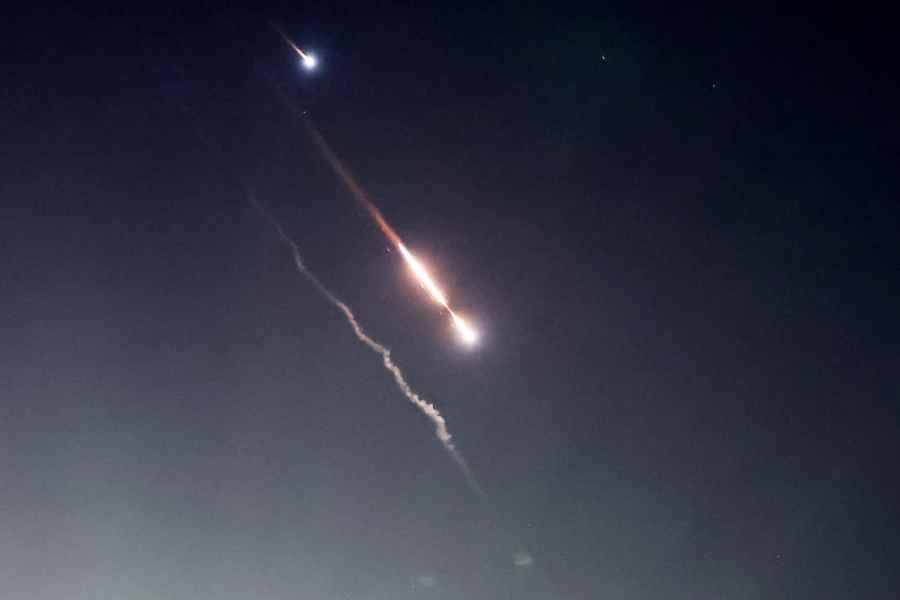It would be easy to be dazzled by the way Israeli, American and other allied militaries shot down virtually every Iranian drone, cruise missile and ballistic missile launched at Israel and conclude that Iran had made its point — retaliating for Israel allegedly killing a top Iranian commander operating against Israel from Syria — and now we can call it a day. That would be a dangerous misreading of what just happened and a huge geopolitical mistake by the West and the world at large.
There now needs to be a massive, sustained, global initiative to isolate Iran — not only to deter it from trying such an adventure again but also to give reason to Israel not to automatically retaliate militarily. That would be a grievous error too. Iran has a regional network, and Israel needs a regional alliance, along with the United States of America, to deter it over the long run. So there must be major diplomatic and economic consequences for Iran, with countries like China finally stepping up: when Tehran fired all those drones and missiles, it could not know that virtually all of them would be intercepted. Some were shot down over Jerusalem. A missile could have hit Al-Aqsa Mosque, one of Islam’s holiest shrines. Another could have hit the Israeli Parliament or a high-rise apartment house, causing massive casualties.
In other words, we are talking about an escalation without precedent in the long-running, tightly-contained, shadow war between Iran and Israel that had almost exclusively been limited to targeted Israeli strikes against Iran’s Revolutionary Guard units in Lebanon and Syria — where they have no business being in the first place — and Iran retaliating by having its Lebanese proxy militia, Hezbollah, fire rockets at Israel. We’ve also seen Iran smuggling arms and explosives from Syria into Jordan, the Gaza Strip and the West Bank to be used to kill Israelis and destabilise Jordan, and the Mossad assassinating a nuclear scientist inside Iran.
Israel has never launched such a massive missile strike directly at Iran, and Iran had never done so to Israel either before this. Indeed, no country had attacked Israel directly since Saddam Hussein’s Iraq did with Scud missiles. Without a US-led global initiative to impose sanctions on Iran and further isolate it on the world stage, Iran’s behaviour would be tacitly normalised, in which case Israel will most likely retaliate in kind, and we’re on our way to a major Middle East war and $250-a-barrel oil.
“The alternative to a wider full-scale regional war, which we don’t want and Israel doesn’t want, cannot be a return to… status quo ante,” said Nader Mousavizadeh, founder and CEO of the geopolitical consulting firm, Macro Advisory Partners. A global effort to isolate Iran, Mousavizadeh added, “is the best way to separate the regime from its people, reassure… Israelis of their security and remove the need for further regional military escalation…” It is also the best way to ensure that Prime Minister Benjamin Netanyahu does not drag the US into a regional war to shore up his own crumbling political base.
It is impossible to exaggerate the political-military implications of what just happened. Shortly after the missile strike, President Ebrahim Raisi of Iran issued a statement declaring that the Revolutionary Guard had “taught a lesson to the Zionist enemy.” It sure did, but it may not be the one Raisi thinks.
Iran just unwittingly revealed to the whole world that Iran’s government is so penetrated by Western espionage agencies that President Joe Biden was able to predict almost the exact hour of attack over a day in advance, and it showed the whole world that Israel and its Western allies have far superior antimissile capabilities than Iran has missile capabilities.
That may explain why Raisi, after his boast about teaching Israel a lesson, asked (pleaded?) that the US and all other “supporters of the occupying regime… appreciate this responsible and proportionate action by the Islamic Republic of Iran” and not go on the offensive against Iran. Message to the world from Tehran: we were just sending a little warning shot; nothing to worry about here; let’s move on.
One reason Iran supports the Hamas war and prefers that Israel remains stuck in Gaza and occupying the West Bank is that it keeps the world and many Americans focused on Israeli actions rather than on the brutal crackdown against democracy protesters in Iran and on Iran’s imperialist influence in the region where it uses proxies to control the politics of Lebanon, Syria, Iraq and Yemen and exploits those countries as military bases to attack Israel.
No one should think Iran is just a paper tiger. Tehran can still unleash thousands of shorter-range rockets against Israel through Hezbollah — and because some of these rockets have precision guidance, they could do significant damage to Israel’s infrastructure. Iran has bigger missiles in its arsenal as well.
Still what happened on that day is ultimately a significant boost for what I call the ‘Inclusion Network in the Middle East’ — more open, connected countries like Jordan, Saudi Arabia, Bahrain, the United Arab Emirates, Egypt and Israel and the NATO allies — and a real setback for the ‘Resistance Network’ — the closed and autocratic systems represented by Iran, Hamas, Hezbollah, the Houthis and Iran’s Shiite militias in Iraq and Russia. The sound within Iran and the Resistance Network after the attack is that sound you hear from your car’s GPS after a wrong turn: ‘Recalculating, recalculating, recalculating.’
New York Times News Service










